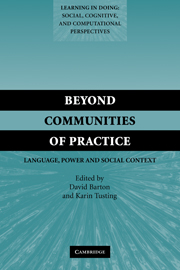Book contents
- Frontmatter
- Contents
- List of Contributors
- Series Foreword
- Introduction
- 1 Literacy, reification and the dynamics of social interaction
- 2 Language and power in communities of practice
- 3 Mediating allegations of racism in a multiethnic London school: what speech communities and communities of practice can tell us about discourse and power
- 4 “I've picked some up from a colleague”: language, sharing and communities of practice in an institutional setting
- 5 The person in the doing: negotiating the experience of self
- 6 Communities of practice and learning communities: do bilingual co-workers learn in community?
- 7 Moving beyond communities of practice in adult basic education
- 8 ‘Communities of practice’ in higher education: useful heuristic or educational model?
- 9 Communities of practice, risk and Sellafield
- 10 Semiotic social spaces and affinity spaces: from The Age of Mythology to today's schools
- Author Index
- Subject Index
- LEARNING IN DOING
- References
1 - Literacy, reification and the dynamics of social interaction
Published online by Cambridge University Press: 24 November 2009
- Frontmatter
- Contents
- List of Contributors
- Series Foreword
- Introduction
- 1 Literacy, reification and the dynamics of social interaction
- 2 Language and power in communities of practice
- 3 Mediating allegations of racism in a multiethnic London school: what speech communities and communities of practice can tell us about discourse and power
- 4 “I've picked some up from a colleague”: language, sharing and communities of practice in an institutional setting
- 5 The person in the doing: negotiating the experience of self
- 6 Communities of practice and learning communities: do bilingual co-workers learn in community?
- 7 Moving beyond communities of practice in adult basic education
- 8 ‘Communities of practice’ in higher education: useful heuristic or educational model?
- 9 Communities of practice, risk and Sellafield
- 10 Semiotic social spaces and affinity spaces: from The Age of Mythology to today's schools
- Author Index
- Subject Index
- LEARNING IN DOING
- References
Summary
INTRODUCTION
We work in Literacy Studies and approach the notion of community of practice to see how it can strengthen or challenge what we do. The field of literacy studies has developed in parallel with communities of practice work over the past twenty years. The two approaches have common roots in the work of Scribner and Cole (1981), but then the fields of situated learning and situated literacies largely developed separately. Our overall point is that the framings provided by theories of language, literacy, discourse and power are central to understanding the dynamics of communities of practice, but they are not made explicit in Wenger's formulations. These ideas form the basis of this and the following chapter. Our own work has examined the literacy practices of everyday life (as in Barton and Hamilton 1998; Barton, Hamilton and Ivanič 2000), and here we see that most social interactions in contemporary society, including those covered by Wenger, are textually mediated; this shapes, structures and constrains them. We will argue that the concept of reification in the communities of practice work is key to making the link with literacy studies.
In this chapter, we start out from the vignettes that form the data for Wenger's work in his 1998 book. We examine them through the lens of literacy studies, demonstrating the centrality of literacy practices and arguing that a textually mediated social world is revealed.
- Type
- Chapter
- Information
- Beyond Communities of PracticeLanguage Power and Social Context, pp. 14 - 35Publisher: Cambridge University PressPrint publication year: 2005
References
- 75
- Cited by

